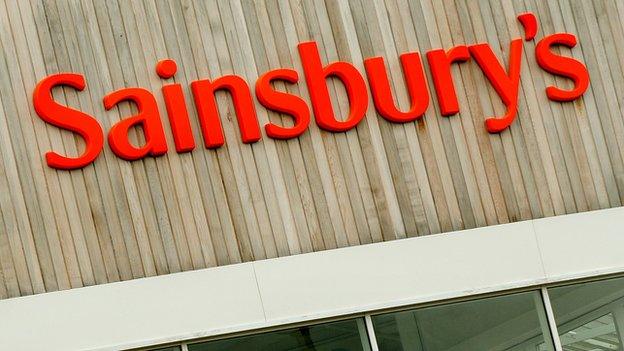Sainsbury's reports rise in profits
- Published
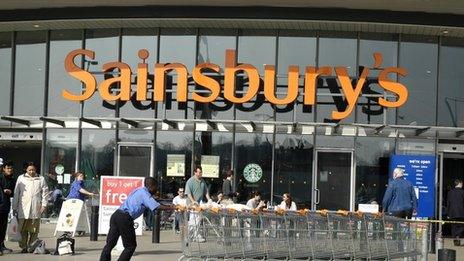
UK supermarket chain Sainsbury's has reported a rise in annual profits but warned of "challenging" times ahead.
Pre-tax profit for the year to 15 March rose by 16.3% to £898m.
However, like-for-like sales, which strip out trading at new stores, excluding fuel, rose by just 0.2%.
The firm said, external it had maintained market share in a "tough retail environment". The big four supermarkets are being challenged by low-cost rivals including Aldi and Lidl.
The big four have responded by cutting prices in an attempt to stem the loss of customers to the low-cost chains.
Price war
Sainsbury's chief executive Justin King - who will be leaving the company in July - told the BBC that the retailer would, "match the price activity of our competition - we always have".
Sainsbury's boss Justin King on prices
"There's always a price war in supermarket retailing. Occasional skirmishes break out, I guess this is one of them," he added.
"In the end it isn't just about price. Quality, the provenance of sourcing is a big factor as well."
Sainsbury's said sales of general merchandise were increasing at more than twice the rate of food.
The relaunch of its clothing brand, which represented its single biggest investment in its clothing business since 2004, had helped generate sales of £750m.
The supermarket's results come a month after Tesco reported a second fall in profits in as many years.
The UK's biggest supermarket chain said group trading profit fell 6% to £3.3bn, with like-for-like sales down 1.4%.
'Relief' for investors
In March, Sainsbury's had reported its first quarterly fall in like-for-like sales for nine years, with sales down 3.1% in the 10 weeks to 15 March.
However, Sainsbury's underlying full-year profits beat analysts' expectations, rising 5.3% to £798m.
Despite this, the company warned that trading was expected to remain tough.
"While the general economic outlook is showing some signs of improvement, conditions in the food retail sector are likely to remain challenging for the foreseeable future as customers continue to spend cautiously," Mr King said.
Analysts called the results solid, adding investors were likely to "breathe a sigh of relief".
Manoj Ladwa, partner at TJM Partnership, added: "Despite numbers across all metrics showing signs of improvement, management won't be able to sit on their laurels as the retail environment continues to remain tough."
Keith Bowman, equity analyst at Hargreaves Lansdown Stockbrokers, said: "Accompanying management comments again point to challenging conditions, concerns for a further ratcheting up of the current price war persist, whilst the change of chief executive does, understandably, raise some nerves."
Sainsbury's share price rose 1.92%, or 6.4p, to 339.8p in early trading on the London Stock Exchange.
Transformation
In January, Sainsbury's announced that Mr King was to leave the supermarket group in July after 10 years at the head of the company.
Mr King is credited with the transformation of Sainsbury's fortunes during his time in charge.
Sainsbury's chairman David Tyler pointed out that under Mr King customer transactions had increased by 10 million a week to around 24 million.
He added annual sales had grown by £10.3bn to £26.4bn, while underlying pre-tax profit had trebled.
Mr King will be succeeded as chief executive by Sainsbury's commercial director Mike Coupe.
Competition
The latest supermarket industry figures from market analysts Kantar Worldpanel, for the 12 weeks to 27 April showed the UK grocery market grew by just 1.9% - its slowest pace for 11 years.
Among the "big four" supermarkets, Asda proved the most resilient, holding its 17.3% market share and narrowly beating the market with 2% year-on-year growth.
Tesco's market share fell 2.4% compared with the same period a year ago to 28.7%.
Sainsbury's and Morrisons also suffered declines in their market share in the period.
Sainsbury's market share fell 0.3% to 16.6% compared with a year earlier, while Morrisons' market share fell 3.6% compared to year before to 11%.
Tesco and Morrisons also recorded a fall in actual sales.
Waitrose, Aldi and Lidl all achieved record growth in market share in the period.
Waitrose's market share rose to 5.1%, Aldi rose to 4.7% and Lidl rose to 3.5% market share.
- Published30 April 2014
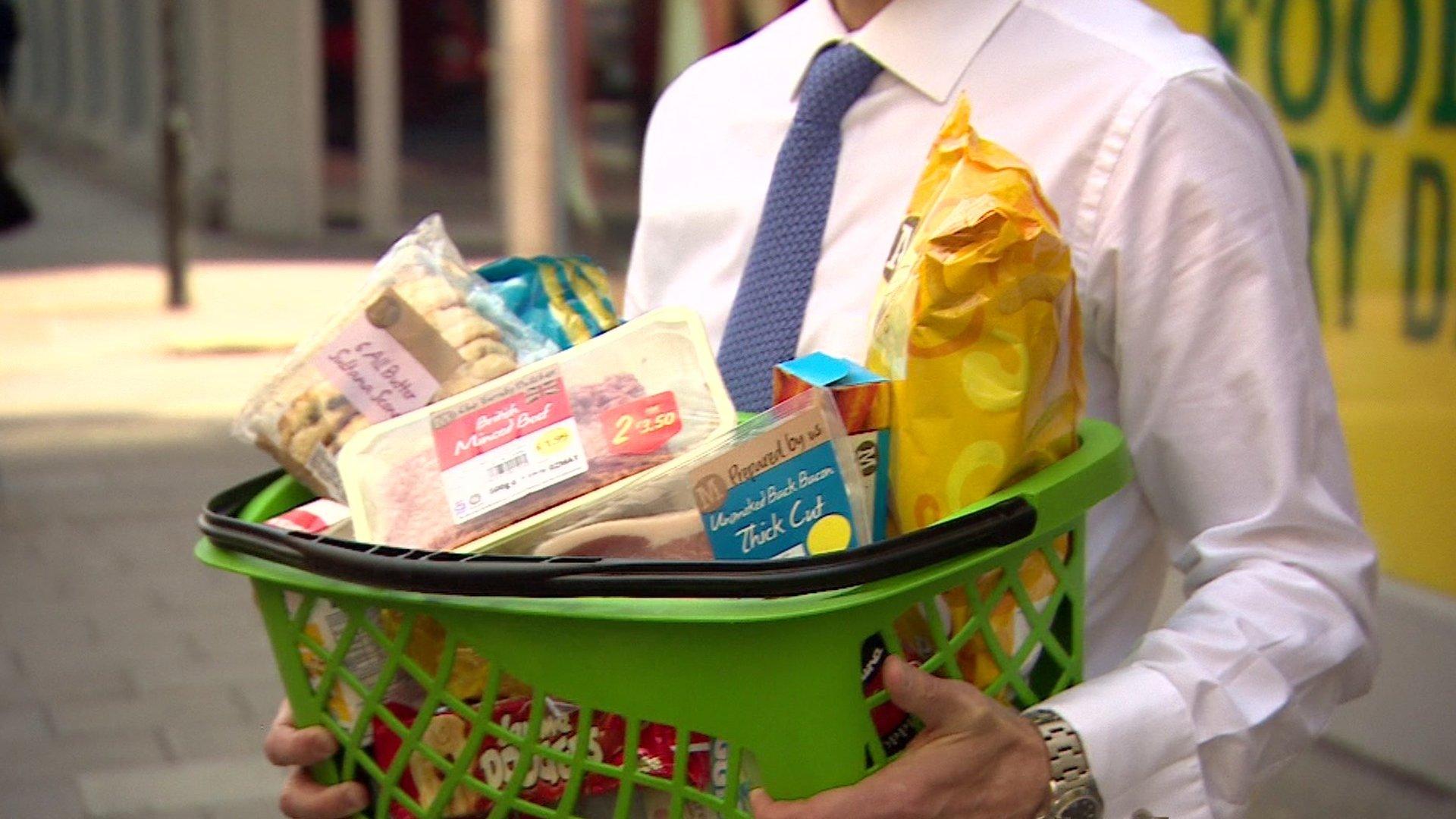
- Published16 April 2014
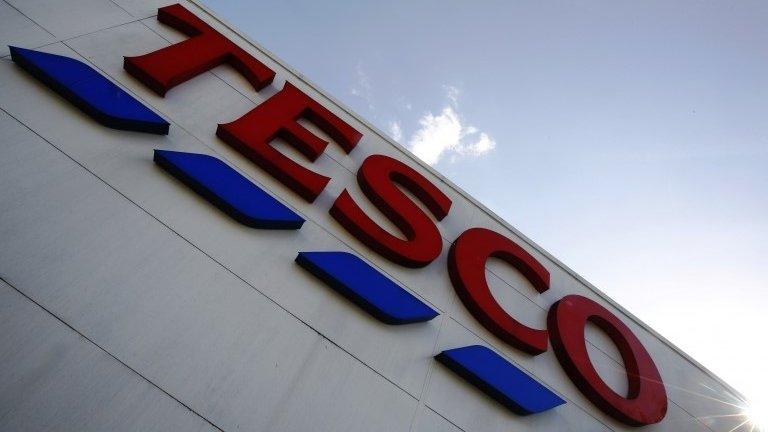
- Published18 March 2014
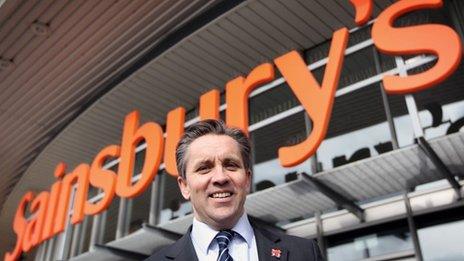
- Published25 February 2014
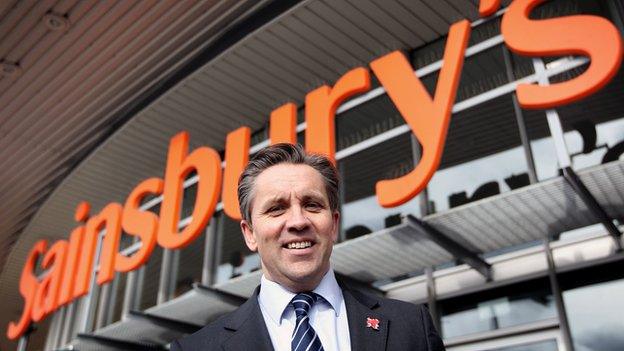
- Published30 January 2014
